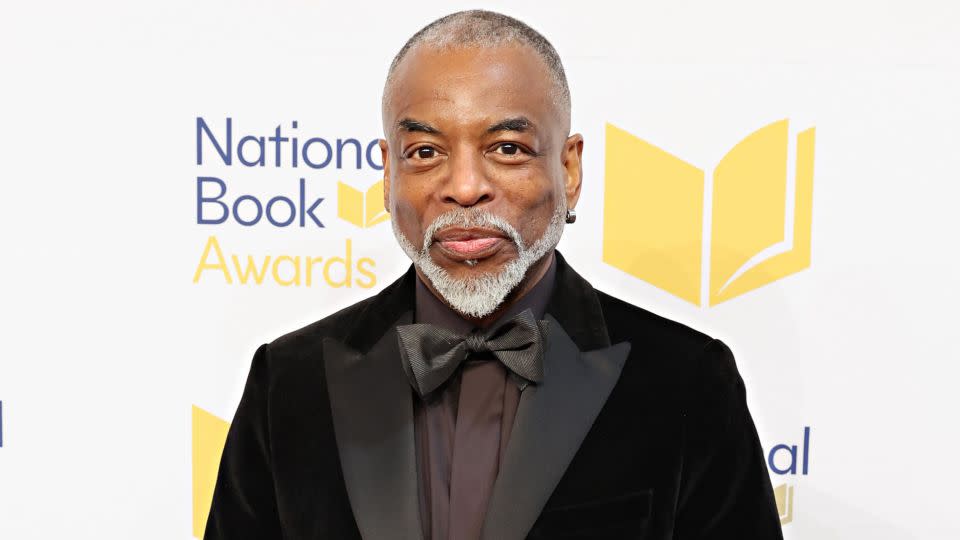The former host of ‘Reading Rainbow’ used to encourage kids to read books. Now he’s telling adults not to ban them

As the National Book Awards came to a close on Wednesday, finalists for the prestigious literary prizes took the stage in New York to speak about the Israel-Hamas war, with others at the ceremony also choosing to address banned books.
Aaliyah Bilal, who was nominated for the fiction award for her short story collection “Temple Folk,” read from a prepared statement as a group of fellow finalists stood around her.
“On behalf of the finalists, we oppose the ongoing bombardment of Gaza and call for an humanitarian ceasefire to address the urgent humanitarian needs of Palestinian civilians, particularly children,” Bilal said at the ceremony.
“We oppose antisemitism and anti-Palestinian sentiment and Islamophobia equally, accepting the human dignity of all parties, knowing that further bloodshed does nothing to secure lasting peace in the region.”
Some audience members in the room responded with a standing ovation. But the authors’ coordinated statement also underscored tensions within the literary community — upon learning that a group of awards finalists planned to make a statement about the war, two sponsors decided not to attend the ceremony, The New York Times reported.
Zibby Owens, owner of Zibby Media, wrote in a Substack essay ahead of the ceremony that her company decided to withdraw its support and attendance after she learned the authors planned to “collectively band together to use their speeches to promote a pro-Palestinian, anti-Israeli agenda.” She added that she felt the event would promote discrimination against Israel and the Jewish people.
The subscription service Book of the Month, which remained a sponsor, told CNN in a statement that it did not attend the ceremony, but continued to support the event.
Oprah and LeVar Burton spoke out about book bans
It’s not unusual for political statements to feature at the National Book Awards, as the National Book Foundation noted in its own statement ahead of the event.
Aside from the finalists’ comments about the Israel-Hamas war, several speakers and authors used their platforms at the awards ceremony to address efforts to ban books in US schools and libraries.
LeVar Burton, a children’s author and former host of the iconic TV program “Reading Rainbow,” emceed the awards ceremony and opened with a joke.
“Before we get going, are there any Moms for Liberty in the house?” he asked, referring to a conservative group behind recent attempts to remove certain books from school shelves. “No? Good. Then hands will not need to be thrown tonight.”
In his opening speech, Burton alluded to the climate in which book banning attempts are taking place.
“It was my mother who taught me at a very young age that if you can read in at least one language, you are, by her definition, free. And that idea of freedom feels especially fraught in this global political moment,” he said. “There are wars and rumors of wars and the machineries of war at work. On the home front, we are fighting for control of truth and how we interpret truth in this country. Books are being banned, words are being silenced and writers and others who champion books are under attack. “
Oprah Winfrey, who was celebrated as the ceremony’s special guest, drew attention to people who have been targeted for pushing back against book banning attempts. She quoted Barbara Kingsolver and Tess Gunty, and name-checked Abraham Verghese and Amanda Gorman, among other authors.
She also spoke about the importance of reading books by diverse authors, sharing how Maya Angelou’s “I Know Why the Caged Bird Sings” had a profound impact on her as a 15-year-old.
“That book gave a voice to my silences, my secrets. It gave words to my pain and my confusion of being raped at 9 years old,” she said. “Until ‘Caged Bird’ I didn’t know that there was a language, there were words, for what had happened to me or that any other human being on earth had experienced it. That’s the power of books.”
At the end of her speech, Oprah said she hoped children would be able to see themselves in the pages of books, and consequently, be able to see others more clearly, too.
“Make no mistake: To ban books is to snuff out the flames of truth, of what it means to be alive, what it means to be aware, what it means to be engaged in the world. To ban books is to cut us off from one another, to shroud us in a solitary darkness, a soulless echo chamber,” she said. “To ban books is to strangle off what sustains us and makes us better people.”
These authors won National Book Awards
Wednesday’s National Book Awards winners reflected a diverse array of subjects.
Justin Torres won the fiction award for “Blackouts,” an experimental novel that blends queer history and fiction to depict a deathbed conversation between two gay men.
Ned Blackhawk received the nonfiction honor for “The Rediscovery of America: Native Peoples and the Unmaking of U.S. History,” a retelling of America’s story that places Indigenous people at its center.
Craig Santos Perez won the poetry prize for his collection “from unincorporated territory [?mot],” about his native Guam and the culture of the Chamorro people.
Dan Santat nabbed the young people’s literature award for his middle-grade graphic memoir, “A First Time For Everything,” and Stênio Gardel won for literature in translation for “The Words That Remain,” translated from Portuguese by Bruna Dantas Lobato.
For more CNN news and newsletters create an account at CNN.com